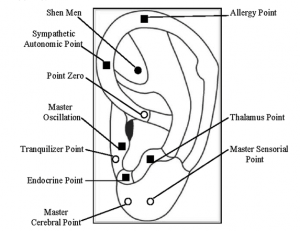Adapted with permission from Acupuncture Today
As we round the corner into 2021, the consequences of 2020 still linger. Last year’s public health, political, and cultural incidents have left scars of trauma on many of our patients. A recent 2020 Global Wellness Institute poll stated that, for more than 50% of American adults, COVID-19 has significantly affected mental health and psychological wellbeing. On behalf of the American Psychological Association a Harris Poll found that, regardless of political affiliation, the 2020 election was a significant source of stress.
According to Sandro Galea, Dean of Boston University School of Public Health, a traumatic event is generally defined as “an experience that causes physical, emotional, psychological distress, or harm. It is an event that is perceived and experienced as a threat to one’s safety or to the stability of one’s world.” These same traumatic events are linked to a broad range of psychological consequences including post-traumatic stress disorder, depression, anxiety, and increased use of substances.
The human brain’s capacity to interpret emotional signaling is an integrative component of neuroscience and clinical research. Complex brain systems dedicated to the detection of emotional experiences of ones surroundings as well as the emotional recognition in others are core characteristics of human behavior. On the face, the ability to express emotions resides within the contraction and relaxation of the superficial mimetic muscles. Repressed or prolonged emotions are expressed in static mimetic muscle markings, notably lines and wrinkles, and as irritation, inflammation, and discoloration on surface skin tissue. These embedded expressions reflect both the symptoms and causes of physical illness. It is postulated that consciously altering one’s facial expression, as in intentionally smiling, can alter one’s emotional state. Interestingly, a 2010 report by Havas, Glenberg, Gutowski, Lucarelli, and Davidson claims that depressed individuals after paralysis of their frowning muscles with Botox injections reported less depression.
Chinese Medicine’s Approach to Treating Trauma
Neuropsychiatric disorders, including trauma related depression and anxiety have long been treated by acupuncture and Chinese medicine. According to the principles of traditional Chinese medicine (TCM), there is no dualism between the body and mind and, therefore, no hierarchy of somatic and psychological symptoms. In essence, TCM views the body, mind, emotions, and spirit as one. Numerous clinical reports from various sources attest to the efficacy of acupuncture for depression, anxiety disorders, schizophrenia, and Alzheimer’s disease.
As acupuncturists, we are trained to treat the root cause of trauma related to life’s turmoil, as it is imbedded in the pattern recognition, diagnosis, and treatment of qi, blood, and fluids as they influence and are influenced by the elements, organs, and meridians. Cosmetic facial acupuncturists are additionally trained to recognize the visible effects of unresolved emotions as they appear on the face and use their findings in pattern recognition, diagnosis, and treatment.
Are you interested in becoming a certified acupuncture professional?
Visit the links below to explore our specialized acupuncture programs at a campus near you:
Facial Changes and Emotions: Indicators in CM
| ORGAN | EMOTIONS | FACIAL CHANGES |
| Heart | Anxiety, restlessness, agitation, excessive joy | Fine lines, skin dryness/redness |
| Kidneys | Fear, depression | Skin puffiness, darkness/puffiness around and under the eyes |
| Spleen | Worry, pensiveness | Decreased muscle tone, skin laxity |
| Lungs | Grief, sadness | Creasing in the cheek area, dry/dull/ lifeless complexion, skin congestion/problems |
| Liver | Anger, frustration | Wrinkles across the forehead/between the eyebrows, skin discoloration |
Specific Treatment Strategies for Trauma in Acupuncture
In TCM, the heart and kidneys are commonly associated with emotional wellbeing. According to classic texts, when the heart is strong and healthy, the mind is calm, focused, and relaxed. When out of balance, restlessness and agitation cause nervousness, anxiety, or panic. The mind (shen) is also housed in the heart and is dependent upon its proper functioning. Inability to concentrate, mental fogginess or confusion, is an indication of a deficiency of heart qi or blood. In concert with the heart, TCM relates anxiety to a loss of balance between the heart and kidney. When there is too much heat in the heart, it will affect the water aspect of kidney. When kidney water is unable to contain heart fire, heat rises to the mind and anxiety ensues.
Additionally, confusion, worry, and lack of stability can be addressed by treating the spleen. If there are signs of desolation, sadness and grief, treating the lungs is beneficial. Anger and frustration turned inward (self-loathing) or outward (jealously, resentment) can be addressed by harmonizing the liver.
In a 2019 observational study, Moiraghi, et al, observed adult patients with earthquake-related post-traumatic stress. According to the results:
“Of the patients, 68.3% reported had both pain and psychological symptoms. The most frequently used meridian points were kidney (13.17%), followed by large intestine (12.46%), spleen (12.04%) and gall bladder (10.34%). After 3 treatments performed in daily sessions, 54.05% and 60.6% of patients reported marked improvements in psychological and pain symptoms, respectively”.
Ear Acupuncture in Trauma Treatment
When treating trauma, adding ear acupuncture points can be extremely beneficial. The practice of auricular acupuncture is referenced in one of the oldest Chinese medical texts, the “Yellow Emperor’s Classics of Internal Medicine”. In the 1950s, French physician Paul Nogier spread the benefits of auriculotherapy throughout Europe.
Ear acupuncture points are divided into three categories: master, functional, and body. Master points can be used to complement other auricular acupuncture points or can be used as a sole treatment. Master points have been described as the most active and useful points on the ear. Adding the two master points, shen men and the cerebral point, into clinical treatment facilitates both immediate and long-term results.
Surface view of auricular master points. (◯) represents raised portions of the auricle, (•) represents deep regions of the auricle, and (▪) represents hidden regions of the auricle. Oleson T: Auriculotherapy Manual; Chinese and Western Systems Ear Acupuncture. 3rd ed London, United Kingdom, Churchill Livingstone, 2003. Used with permission from Elsevier Copyright Clearance Center and Dr. Terry Oleson.
| Shen Men | Tranquilizes the mind and to allow a harmonious connection to ones spirit. This master point alleviates stress, pain, tension, anxiety, depression, insomnia, restlessness, and excessive sensitivity. One of the first points emphasized for the detoxification from drugs and the treatment of alcoholism and substance abuse, it is generally added into most treatment plans, including auricular acupuncture analgesia for surgery. |
| Master Cerebral | The part of the cerebral cortex that makes decisions and initiates conscious action. Stimulation of this auricular point diminishes nervous anxiety, fear, worry, lassitude, dream-disturbed sleep, poor memory, obsessive-compulsive disorders, psychosomatic disorders, and the negative pessimistic thinking. |
Integrating CM in Modern Healthcare for Emotional Well-being
As emotional wellbeing (feeling good internally) and medical wellbeing (being free from illness) take center stage, TCM has the potential to play a significant role in today’s healthcare climate. Studies show that acupuncture therapy is effective in improving emotional and mental well-being and easing symptoms associated with specific mental health disorders such as anxiety and depression. TCM principles integrate well with other systems, including Western medicine, and are often included among integrative medicine. TCM modalities offer an effective theoretical basis for assessing and clinically managing patients presenting with mental health issues.
References
- https://globalwellnessinstitute.org/global-wellness-institute-blog/2020/08/25/a-mental-health-crisis-is-surging/
- https://www.apa.org/news/press/releases/2020/10/election-stress
- Coles, N. A., Larsen, J. T., & Lench, H. C. (2019). A meta-analysis of the facial feedback literature: Effects of facial feedback on emotional experience are small and variable. Psychological Bulletin, 145(6), 610–651.
- Havas, D. A., Glenberg, A. M., Gutowski, K. A., Lucarelli, M. J., & Davidson, R. J. (2010). Cosmetic use of botulinum toxin-a affects processing of emotional language. Psychological science, 21 (7), 895–900.
- Tu, C. H., MacDonald, I., & Chen, Y. H. (2019). The Effects of Acupuncture on Glutamatergic Neurotransmission in Depression, Anxiety, Schizophrenia, and Alzheimer’s Disease: A Review of the Literature.Frontiers in psychiatry, 10, 14.
- Moiraghi, C., Poli, P., & Piscitelli, A. (2019). An Observational Study on Acupuncture for Earthquake-Related Post-Traumatic Stress Disorder: The Experience of the Lombard Association of Medical Acupuncturists/Acupuncture in the World, in Amatrice, Central Italy. Medical acupuncture, 31(2), 116–122.
- Heather C. King, NC USN, Anita H. Hickey, MC USN, Cynthia Connelly, RN, PhD, FAAN, Auricular Acupuncture: A Brief Introduction for Military Providers, Military Medicine, Volume 178, Issue 8, August 2013, Pages 867–874.
- http://www.earseeds.com
- Oleson T: Auriculotherapy Manual: Chinese and Western Systems of Ear Acupuncture. 3rd ed. London, Churchill Livingstone, 2003.
Featured Posts:

